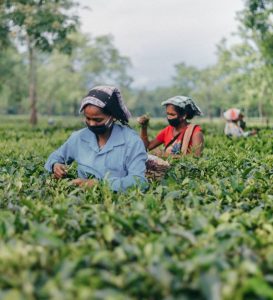The Taste of Tea – the True Cost
by Sr. Prisca Ovat MMM Nigeria/Kenya 18.10.2023
 History has it that the first tea seeds were introduced by the expatriates over a century ago in Kiambu County, Kenya. From then on, 19 tea-growing counties emerged, due to the tropical volcanic red soils and evenly distributed rainfalls suitable for tea survival. As a matter of economy, tea is among the principal foreign exchange earners in Kenya, with both direct and indirect support to better living. But what do we know about the safety regulations, practice, and respect of human rights within the tea factories?
History has it that the first tea seeds were introduced by the expatriates over a century ago in Kiambu County, Kenya. From then on, 19 tea-growing counties emerged, due to the tropical volcanic red soils and evenly distributed rainfalls suitable for tea survival. As a matter of economy, tea is among the principal foreign exchange earners in Kenya, with both direct and indirect support to better living. But what do we know about the safety regulations, practice, and respect of human rights within the tea factories?
As a member of the African Faith and Justice Network, the working conditions of the employees at the Kenya tea factories was discussed as a matter of concern and urgency. The AFJN is a network of many religious and laypersons. One key question was asked: is tea really worth a woman’s dignity? We sought many ways to lend our voice in this unfortunate menace that strips a woman of her self-worth, amidst all other injustices meted on the female gender. This great exposé came to light in February 2023 a documentary made by the BBC Africa Eye which had remained under cover inside the tea factory with a hidden camera for 18 months and from then on, the subject gained global attention. In this documentary, it was unearthed that over seventy women had over the years been abused by their frontline managers, while others contracted varied forms of sexually transmitted diseases.
For some adventurous reasons, I found myself prying into life in the tea plantation. Life is as hard as could never had been imagined. Farmers are paid monthly. Some tribes are unjustly treated as managers are more inclined to looking favourably in the way of their own tribe’s people (a common inequality in the distribution of goods and employment peculiar to certain African countries). Additionally, the grounds men and women sweat it out in the rain and the sun, while the farm owners receive the payments on their behalf at Ksh 50 (USD 0.34) per kg leaving the workers with just 5 shillings (USD 0.034). Sometimes the money is held for as long as they desire before its final release to the workers and after several trips to the employers for their money which can mean several incidences of abuse.
However, in July this year, a Scottish court ruled that victims may proceed to sue the companies in question. Justice shall finally take its course, at least for the living. Topics as these are daily trending on social media and read over the news (sex for grades in institutions of learning, sex for jobs, even when they are rightly qualified for it). It is a difficult fashion to break away from because when evil is normalised in a culture, impunity begins to wear the face of innocence.
We each have the duty of care as educators, parents, religious leaders, and counsellors to sanitize our cultures. For we alone can redeem our society for us.
SEE ALL BLOG POSTS
